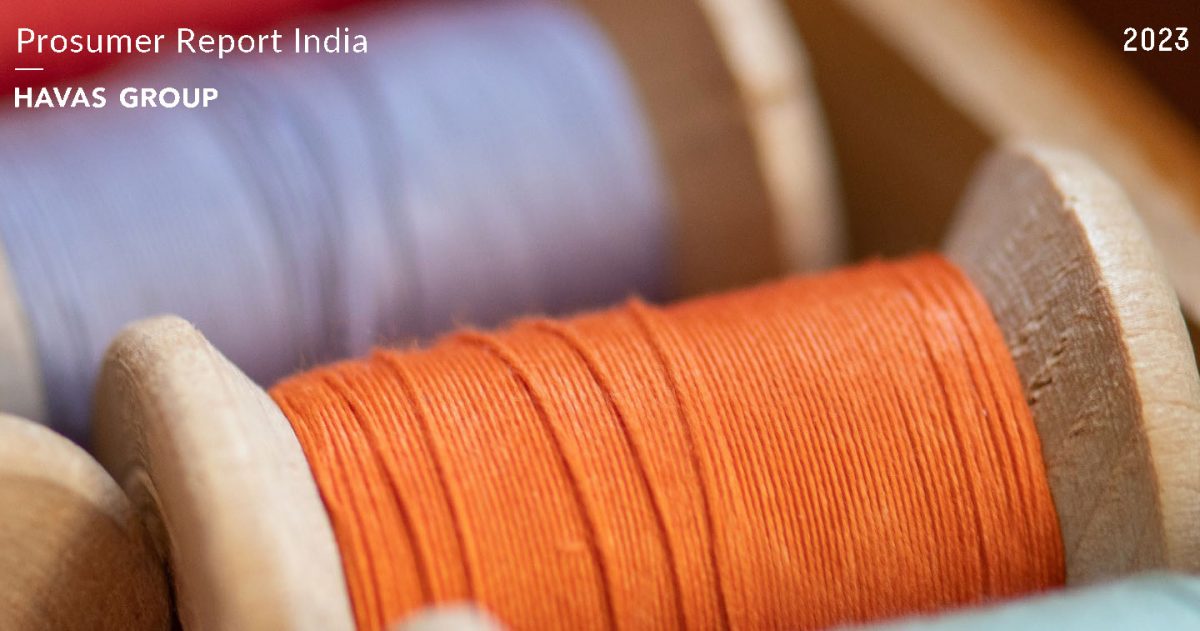MUMBAI, INDIA — Over the past century, the world shifted to an economic system in which growth is tied to overconsumption and a wasteful lifestyle, resulting in environmental destruction. Citizens have evolved into consumers, and governments rely on people’s continuous spending to keep the system running, but what happens when the costs of that consumption-driven system become unsustainable and undesirable, not just ecologically but also psychologically, eroding life satisfaction?
The answers to these questions and more are in the Havas 2023 Prosumer Report which polled over 12,929 people across 30 markets including Brazil, China, France, India, the United Kingdom, and the United States. Prosumers are today’s leading influencers and market drivers. They have been a focus of Havas studies for two decades. Beyond their own economic impact, Prosumers are important because they influence the brand choices and consumption behaviors of others. What Prosumers are doing today, mainstream consumers will likely be doing six to 18 months from now.
The findings of this recent report are firmly aligned with Havas’ ethos of putting people, our planet, and profit on an equal footing by leveraging business as a force for good.
Here’s how the story goes: In 2023, people are fed up. Faced with escalating inflation, economic inequity, an energy crisis exacerbated by the war in Ukraine, shaken faith in the banking system, and fears of a global recession, all atop the introspection and questioning sparked by the “great pause” of the pandemic, more of us are considering a different approach, starting with changes in how we consume. We want to live with less to have more of a meaningful existence. More free time. More financial security and psychological freedom. More faith that our planet will survive.
A more frugal approach to consumption is in the interest of society and the planet, but how feasible is that? And just how far are people prepared to go? Through the report, Havas has identified that frugality is about buying better, reducing waste, cutting back, and becoming more self-sufficient. It discovered what people are happy to do, what they would never do, and even where they believe governments should step in.
Many people, across the world, are turning toward a lifestyle of more conscious consumption. There is a movement toward consuming less, focusing on minimalism, and embracing the sharing economy. Through its research, Havas found that 79% of Prosumers, and even 67% of mainstream consumers, believe that they could be happy in a more frugal world. It is even framed as an aspiration.
Trends will always drive behavior. People strive to have the new and cool thing, but what if that thing isn’t something you’re buying? What if it is a new attitude you’re adopting? 82% of Prosumers say that they admire people who have made the transition to a more frugal lifestyle. With influencers and change-makers taking up the fight against climate change, we could see a shift into an eco-cool era.
While brands can play a much larger role in this new world-order, only 8% of Prosumers believe they are doing the most they can to combat climate change. Around 84% believe that large companies are better able to make the changes necessary to combat.
What can brands do to drive this movement?
- Educate the public: Just under seven in 10 Prosumers consider education key to the fight against climate change. Knowing the impact we have, both positive and negative, is crucial for making informed decisions.
- Make simplicity desirable: A push for this way of living can be bolstered by brand narratives championing simplicity and essentiality; plus elevating those who have elected to live more frugally. 74% of Prosumers and mainstream consumers alike agree that what makes them most happy is being satisfied with simple things.
- Create connections to nature: 63% of Prosumers desire a more frugal life because it means living a life closer to nature. The rise of trends like cottagecore amongst the younger generations are signaling a push toward a more “natural life.”
- Connect people: Consuming more mindfully also means rejecting the rat race of the past half-century. For most Prosumers, the ability to work less and spend more time with family is part of the appeal of frugal living.
The Havas findings show that less is more, evidently. How can businesses support this shift in people living a more mindful and frugal life, while making the entire experience satisfying and joyful? Going by the Prosumer report, its key findings from India have thrown light on consumer behaviors that precisely reflect the changing paradigm of us as a society:
- In India, 84% of prosumers believe that bigger institutions like brands & businesses, local communities, and government bodies are responsible for causing climate change.
- The motivation to adopt a frugal lifestyle is driven by a desire for a healthier way of living (89%) and ecological concerns (70%) more than economic reasons (47%).
- 93% of Indian prosumers agree that they will act towards the environment when they can measure the impact of their actions.
- 70% of Indian Prosumers feel that we must impose rules, even hard ones, and not wait for everyone’s goodwill.
- To live in a more frugal world, we must ban advertising for fossil fuel companies (51%), big promotional events (45%), fast fashion (36%), meat (35%), plane and plane companies (28%), and cars (22%).
- Prosumers are willing to adopt a frugal lifestyle by saving energy (82%) and reducing their consumption (61%) but are not willing to compromise on lifestyle experiences such as consuming meat or traveling on long-haul flights.
- In India, consumers perceive that solutions to climate issues will emerge through new technology (69%) rather than changing their behavior (31%).

Anirban Mozumdar, Chief Strategy Officer of Havas Creative India, said, “As the world embraces Joyful frugality, the Prosumer Report notes that Indians are ahead of the forefront of the curve. From cultural belief to an urgent need to preserve the planet in crisis, Indian prosumers want to witness the influence of their contributions and make frugal choices not for the sake of value, but for the greater good. What’s even more interesting is their willingness to accept government directives, even if they are hard ones. Prosumers also view brands and companies as the most responsible and capable of making the greatest impact.”
Whether practicing frugality or pursuing a luxurious lifestyle, consumers respond to the same motivations:
They want to feel good (internal motivator), be admired by others or look good (external motivator), and derive maximum value and satisfaction from their consumption choices.
For over a century, marketers have been selling a dream that is no longer sustainable, and increasingly less desirable. Rather than enjoy what their money can buy, many consumers feel stressed, overburdened, unhealthy, and dissatisfied.
Businesses and brands have the power, and arguably the obligation, to contribute to a better way forward.











